Professional Writing: Exploring the Dynamics of Friendship
VerifiedAdded on 2023/06/10
|6
|1301
|250
Essay
AI Summary
This essay on professional writing delves into the multifaceted concept of friendship, examining its definition, benefits, and challenges. It references various studies and researchers to illustrate the importance of friendship in promoting emotional well-being, providing support during difficult times, and fostering a sense of belonging. The essay explores the qualities of a good friendship, including loyalty, trust, and honesty, while also addressing factors that can limit the duration of friendships, such as human nature and changing life circumstances. It further discusses the impact of social media on friendships, the importance of giving-and-taking in maintaining positive relationships, and the potential drawbacks of spending too much time together. The essay concludes by emphasizing that while friendships may have some demerits, their merits exceed the disadvantages, highlighting the critical role friendships play in an individual's life.
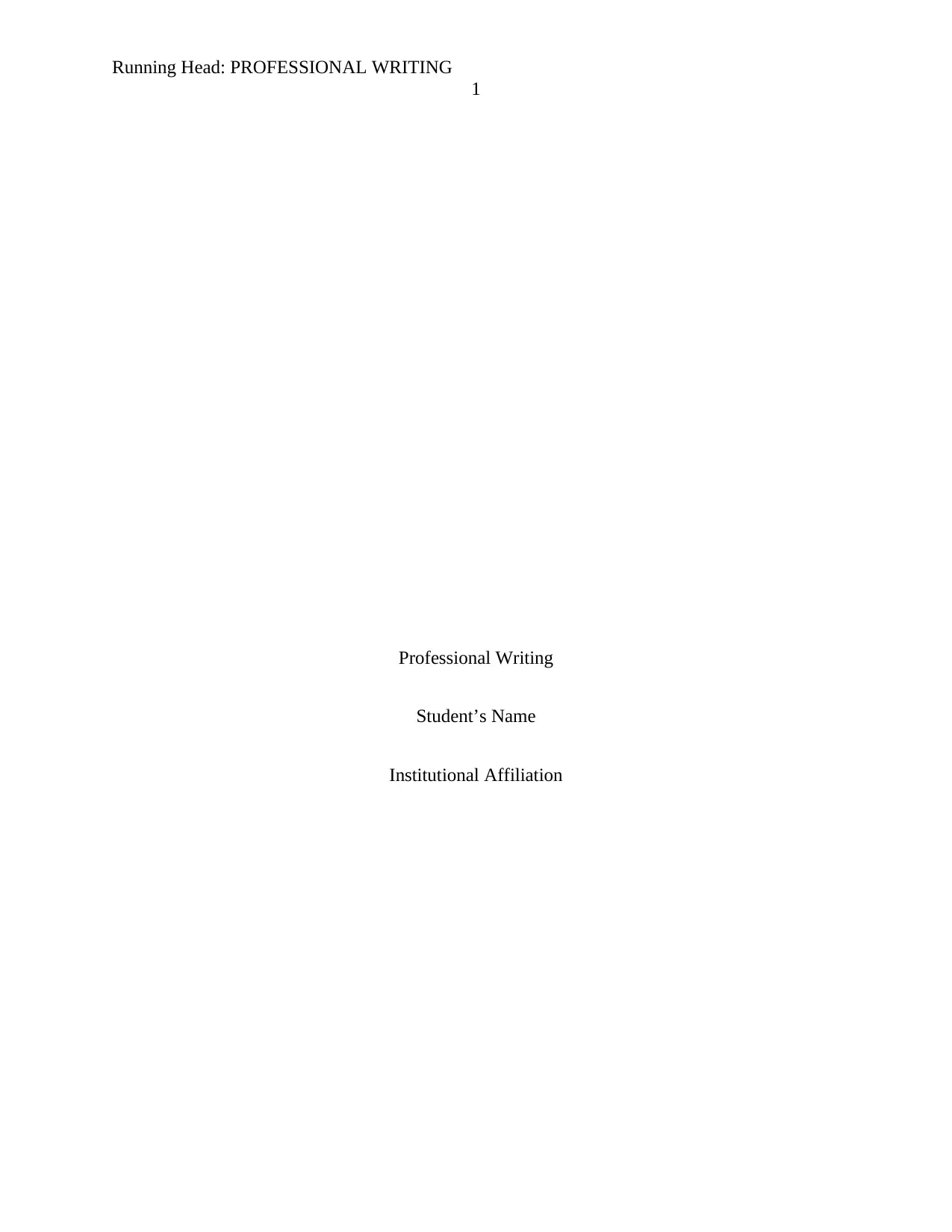
Running Head: PROFESSIONAL WRITING
1
Professional Writing
Student’s Name
Institutional Affiliation
1
Professional Writing
Student’s Name
Institutional Affiliation
Paraphrase This Document
Need a fresh take? Get an instant paraphrase of this document with our AI Paraphraser
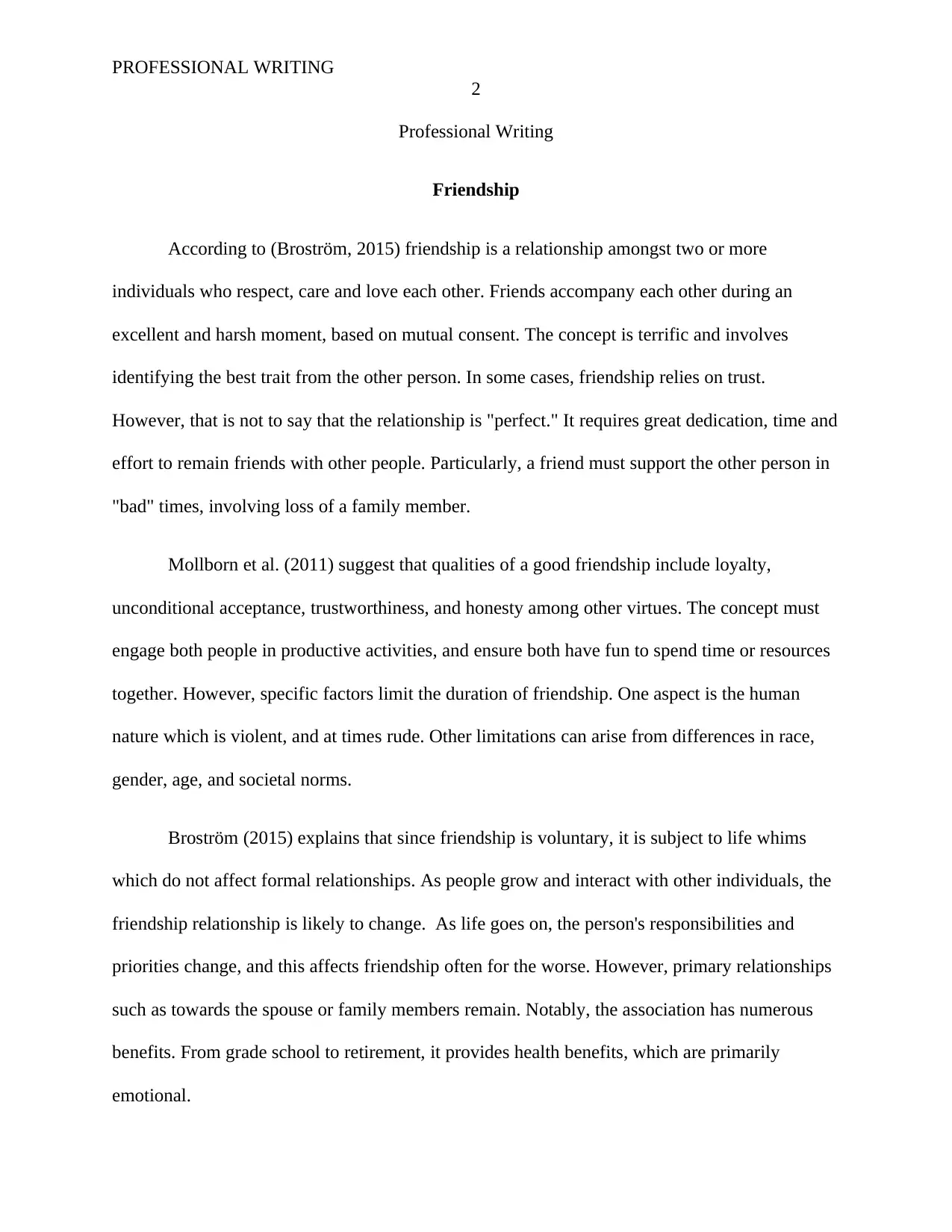
PROFESSIONAL WRITING
2
Professional Writing
Friendship
According to (Broström, 2015) friendship is a relationship amongst two or more
individuals who respect, care and love each other. Friends accompany each other during an
excellent and harsh moment, based on mutual consent. The concept is terrific and involves
identifying the best trait from the other person. In some cases, friendship relies on trust.
However, that is not to say that the relationship is "perfect." It requires great dedication, time and
effort to remain friends with other people. Particularly, a friend must support the other person in
"bad" times, involving loss of a family member.
Mollborn et al. (2011) suggest that qualities of a good friendship include loyalty,
unconditional acceptance, trustworthiness, and honesty among other virtues. The concept must
engage both people in productive activities, and ensure both have fun to spend time or resources
together. However, specific factors limit the duration of friendship. One aspect is the human
nature which is violent, and at times rude. Other limitations can arise from differences in race,
gender, age, and societal norms.
Broström (2015) explains that since friendship is voluntary, it is subject to life whims
which do not affect formal relationships. As people grow and interact with other individuals, the
friendship relationship is likely to change. As life goes on, the person's responsibilities and
priorities change, and this affects friendship often for the worse. However, primary relationships
such as towards the spouse or family members remain. Notably, the association has numerous
benefits. From grade school to retirement, it provides health benefits, which are primarily
emotional.
2
Professional Writing
Friendship
According to (Broström, 2015) friendship is a relationship amongst two or more
individuals who respect, care and love each other. Friends accompany each other during an
excellent and harsh moment, based on mutual consent. The concept is terrific and involves
identifying the best trait from the other person. In some cases, friendship relies on trust.
However, that is not to say that the relationship is "perfect." It requires great dedication, time and
effort to remain friends with other people. Particularly, a friend must support the other person in
"bad" times, involving loss of a family member.
Mollborn et al. (2011) suggest that qualities of a good friendship include loyalty,
unconditional acceptance, trustworthiness, and honesty among other virtues. The concept must
engage both people in productive activities, and ensure both have fun to spend time or resources
together. However, specific factors limit the duration of friendship. One aspect is the human
nature which is violent, and at times rude. Other limitations can arise from differences in race,
gender, age, and societal norms.
Broström (2015) explains that since friendship is voluntary, it is subject to life whims
which do not affect formal relationships. As people grow and interact with other individuals, the
friendship relationship is likely to change. As life goes on, the person's responsibilities and
priorities change, and this affects friendship often for the worse. However, primary relationships
such as towards the spouse or family members remain. Notably, the association has numerous
benefits. From grade school to retirement, it provides health benefits, which are primarily
emotional.
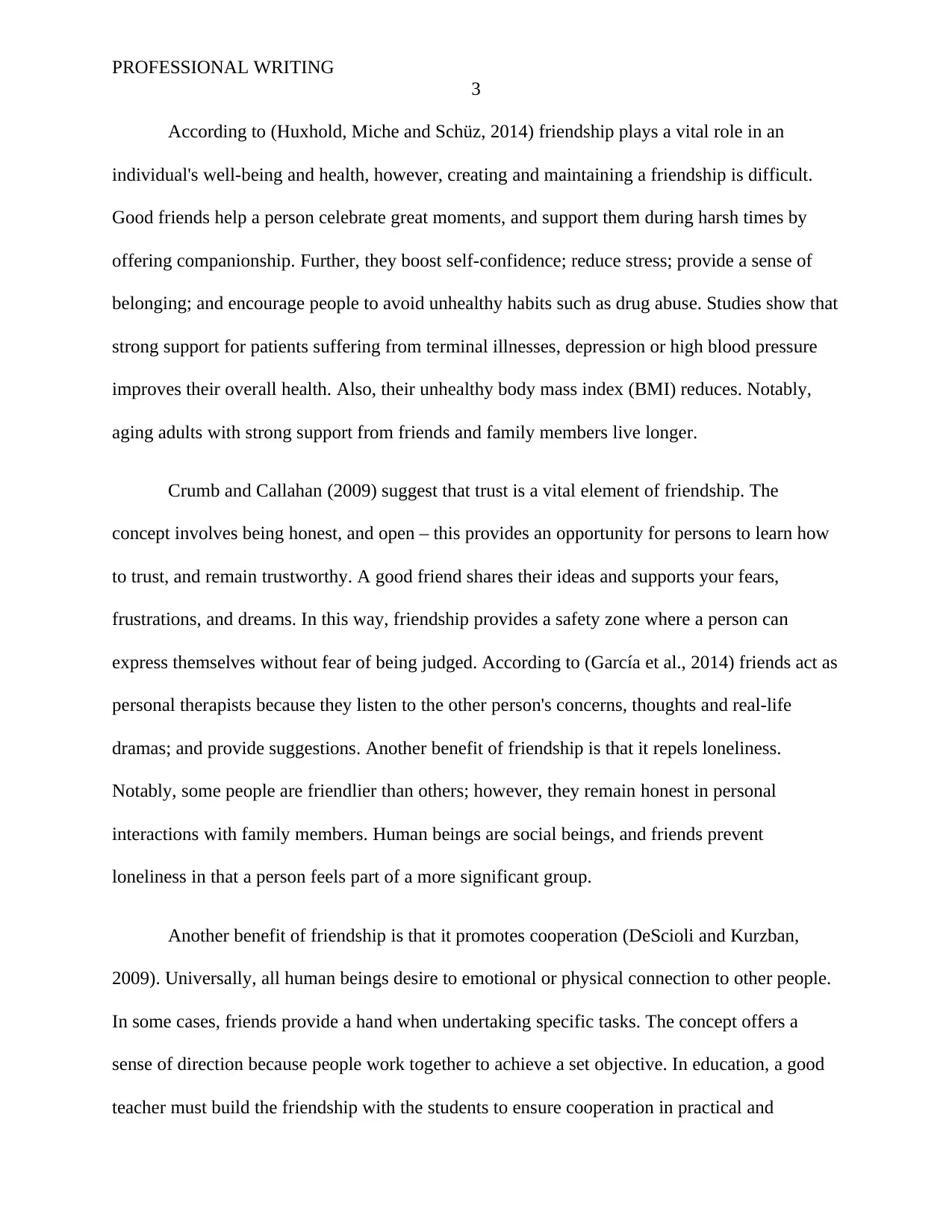
PROFESSIONAL WRITING
3
According to (Huxhold, Miche and Schüz, 2014) friendship plays a vital role in an
individual's well-being and health, however, creating and maintaining a friendship is difficult.
Good friends help a person celebrate great moments, and support them during harsh times by
offering companionship. Further, they boost self-confidence; reduce stress; provide a sense of
belonging; and encourage people to avoid unhealthy habits such as drug abuse. Studies show that
strong support for patients suffering from terminal illnesses, depression or high blood pressure
improves their overall health. Also, their unhealthy body mass index (BMI) reduces. Notably,
aging adults with strong support from friends and family members live longer.
Crumb and Callahan (2009) suggest that trust is a vital element of friendship. The
concept involves being honest, and open – this provides an opportunity for persons to learn how
to trust, and remain trustworthy. A good friend shares their ideas and supports your fears,
frustrations, and dreams. In this way, friendship provides a safety zone where a person can
express themselves without fear of being judged. According to (García et al., 2014) friends act as
personal therapists because they listen to the other person's concerns, thoughts and real-life
dramas; and provide suggestions. Another benefit of friendship is that it repels loneliness.
Notably, some people are friendlier than others; however, they remain honest in personal
interactions with family members. Human beings are social beings, and friends prevent
loneliness in that a person feels part of a more significant group.
Another benefit of friendship is that it promotes cooperation (DeScioli and Kurzban,
2009). Universally, all human beings desire to emotional or physical connection to other people.
In some cases, friends provide a hand when undertaking specific tasks. The concept offers a
sense of direction because people work together to achieve a set objective. In education, a good
teacher must build the friendship with the students to ensure cooperation in practical and
3
According to (Huxhold, Miche and Schüz, 2014) friendship plays a vital role in an
individual's well-being and health, however, creating and maintaining a friendship is difficult.
Good friends help a person celebrate great moments, and support them during harsh times by
offering companionship. Further, they boost self-confidence; reduce stress; provide a sense of
belonging; and encourage people to avoid unhealthy habits such as drug abuse. Studies show that
strong support for patients suffering from terminal illnesses, depression or high blood pressure
improves their overall health. Also, their unhealthy body mass index (BMI) reduces. Notably,
aging adults with strong support from friends and family members live longer.
Crumb and Callahan (2009) suggest that trust is a vital element of friendship. The
concept involves being honest, and open – this provides an opportunity for persons to learn how
to trust, and remain trustworthy. A good friend shares their ideas and supports your fears,
frustrations, and dreams. In this way, friendship provides a safety zone where a person can
express themselves without fear of being judged. According to (García et al., 2014) friends act as
personal therapists because they listen to the other person's concerns, thoughts and real-life
dramas; and provide suggestions. Another benefit of friendship is that it repels loneliness.
Notably, some people are friendlier than others; however, they remain honest in personal
interactions with family members. Human beings are social beings, and friends prevent
loneliness in that a person feels part of a more significant group.
Another benefit of friendship is that it promotes cooperation (DeScioli and Kurzban,
2009). Universally, all human beings desire to emotional or physical connection to other people.
In some cases, friends provide a hand when undertaking specific tasks. The concept offers a
sense of direction because people work together to achieve a set objective. In education, a good
teacher must build the friendship with the students to ensure cooperation in practical and
⊘ This is a preview!⊘
Do you want full access?
Subscribe today to unlock all pages.

Trusted by 1+ million students worldwide
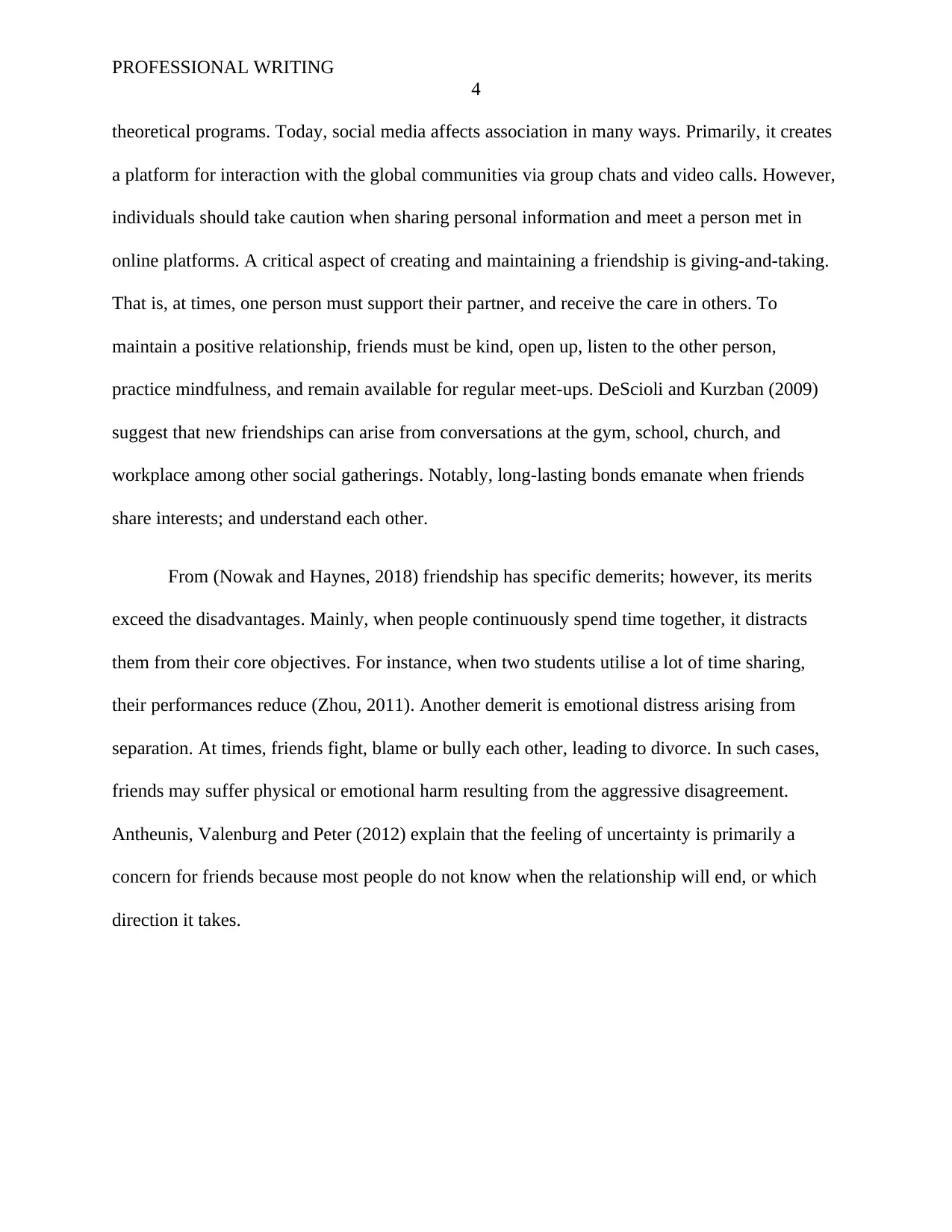
PROFESSIONAL WRITING
4
theoretical programs. Today, social media affects association in many ways. Primarily, it creates
a platform for interaction with the global communities via group chats and video calls. However,
individuals should take caution when sharing personal information and meet a person met in
online platforms. A critical aspect of creating and maintaining a friendship is giving-and-taking.
That is, at times, one person must support their partner, and receive the care in others. To
maintain a positive relationship, friends must be kind, open up, listen to the other person,
practice mindfulness, and remain available for regular meet-ups. DeScioli and Kurzban (2009)
suggest that new friendships can arise from conversations at the gym, school, church, and
workplace among other social gatherings. Notably, long-lasting bonds emanate when friends
share interests; and understand each other.
From (Nowak and Haynes, 2018) friendship has specific demerits; however, its merits
exceed the disadvantages. Mainly, when people continuously spend time together, it distracts
them from their core objectives. For instance, when two students utilise a lot of time sharing,
their performances reduce (Zhou, 2011). Another demerit is emotional distress arising from
separation. At times, friends fight, blame or bully each other, leading to divorce. In such cases,
friends may suffer physical or emotional harm resulting from the aggressive disagreement.
Antheunis, Valenburg and Peter (2012) explain that the feeling of uncertainty is primarily a
concern for friends because most people do not know when the relationship will end, or which
direction it takes.
4
theoretical programs. Today, social media affects association in many ways. Primarily, it creates
a platform for interaction with the global communities via group chats and video calls. However,
individuals should take caution when sharing personal information and meet a person met in
online platforms. A critical aspect of creating and maintaining a friendship is giving-and-taking.
That is, at times, one person must support their partner, and receive the care in others. To
maintain a positive relationship, friends must be kind, open up, listen to the other person,
practice mindfulness, and remain available for regular meet-ups. DeScioli and Kurzban (2009)
suggest that new friendships can arise from conversations at the gym, school, church, and
workplace among other social gatherings. Notably, long-lasting bonds emanate when friends
share interests; and understand each other.
From (Nowak and Haynes, 2018) friendship has specific demerits; however, its merits
exceed the disadvantages. Mainly, when people continuously spend time together, it distracts
them from their core objectives. For instance, when two students utilise a lot of time sharing,
their performances reduce (Zhou, 2011). Another demerit is emotional distress arising from
separation. At times, friends fight, blame or bully each other, leading to divorce. In such cases,
friends may suffer physical or emotional harm resulting from the aggressive disagreement.
Antheunis, Valenburg and Peter (2012) explain that the feeling of uncertainty is primarily a
concern for friends because most people do not know when the relationship will end, or which
direction it takes.
Paraphrase This Document
Need a fresh take? Get an instant paraphrase of this document with our AI Paraphraser
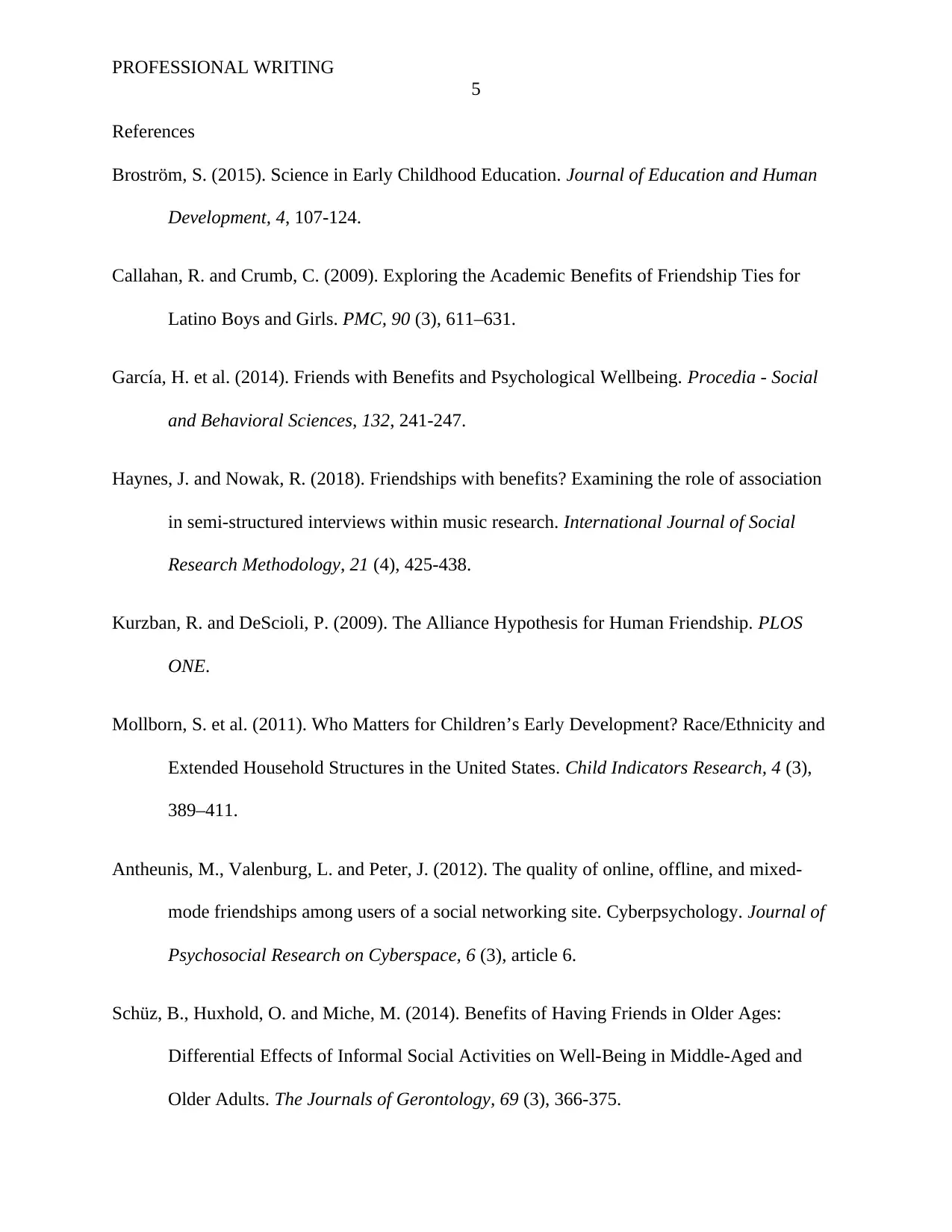
PROFESSIONAL WRITING
5
References
Broström, S. (2015). Science in Early Childhood Education. Journal of Education and Human
Development, 4, 107-124.
Callahan, R. and Crumb, C. (2009). Exploring the Academic Benefits of Friendship Ties for
Latino Boys and Girls. PMC, 90 (3), 611–631.
García, H. et al. (2014). Friends with Benefits and Psychological Wellbeing. Procedia - Social
and Behavioral Sciences, 132, 241-247.
Haynes, J. and Nowak, R. (2018). Friendships with benefits? Examining the role of association
in semi-structured interviews within music research. International Journal of Social
Research Methodology, 21 (4), 425-438.
Kurzban, R. and DeScioli, P. (2009). The Alliance Hypothesis for Human Friendship. PLOS
ONE.
Mollborn, S. et al. (2011). Who Matters for Children’s Early Development? Race/Ethnicity and
Extended Household Structures in the United States. Child Indicators Research, 4 (3),
389–411.
Antheunis, M., Valenburg, L. and Peter, J. (2012). The quality of online, offline, and mixed-
mode friendships among users of a social networking site. Cyberpsychology. Journal of
Psychosocial Research on Cyberspace, 6 (3), article 6.
Schüz, B., Huxhold, O. and Miche, M. (2014). Benefits of Having Friends in Older Ages:
Differential Effects of Informal Social Activities on Well-Being in Middle-Aged and
Older Adults. The Journals of Gerontology, 69 (3), 366-375.
5
References
Broström, S. (2015). Science in Early Childhood Education. Journal of Education and Human
Development, 4, 107-124.
Callahan, R. and Crumb, C. (2009). Exploring the Academic Benefits of Friendship Ties for
Latino Boys and Girls. PMC, 90 (3), 611–631.
García, H. et al. (2014). Friends with Benefits and Psychological Wellbeing. Procedia - Social
and Behavioral Sciences, 132, 241-247.
Haynes, J. and Nowak, R. (2018). Friendships with benefits? Examining the role of association
in semi-structured interviews within music research. International Journal of Social
Research Methodology, 21 (4), 425-438.
Kurzban, R. and DeScioli, P. (2009). The Alliance Hypothesis for Human Friendship. PLOS
ONE.
Mollborn, S. et al. (2011). Who Matters for Children’s Early Development? Race/Ethnicity and
Extended Household Structures in the United States. Child Indicators Research, 4 (3),
389–411.
Antheunis, M., Valenburg, L. and Peter, J. (2012). The quality of online, offline, and mixed-
mode friendships among users of a social networking site. Cyberpsychology. Journal of
Psychosocial Research on Cyberspace, 6 (3), article 6.
Schüz, B., Huxhold, O. and Miche, M. (2014). Benefits of Having Friends in Older Ages:
Differential Effects of Informal Social Activities on Well-Being in Middle-Aged and
Older Adults. The Journals of Gerontology, 69 (3), 366-375.

PROFESSIONAL WRITING
6
6
⊘ This is a preview!⊘
Do you want full access?
Subscribe today to unlock all pages.

Trusted by 1+ million students worldwide
1 out of 6
Related Documents
Your All-in-One AI-Powered Toolkit for Academic Success.
+13062052269
info@desklib.com
Available 24*7 on WhatsApp / Email
![[object Object]](/_next/static/media/star-bottom.7253800d.svg)
Unlock your academic potential
Copyright © 2020–2025 A2Z Services. All Rights Reserved. Developed and managed by ZUCOL.





